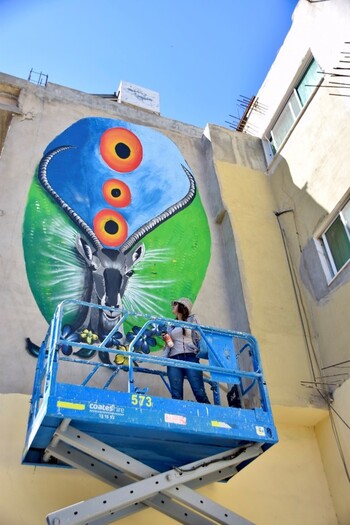Integrating Jordan’s informal waste sector and raising public awareness of the issue
The “EU Support to the implementation of the National Solid Waste Management Strategy – Informal Sector Integration and Awareness Raising”
-
Commissioning Party
Federal German Ministry for Economic Cooperation and Development (BMZ)
-
Cofinancier
European Union (EU)
-
Country
-
Lead executing agency
More
-
Overall term
2018 to 2023
-
Products and expertise
Sustainable infrastructure, water, energy, transport

Context
The Government of Jordan approved its first national solid waste management strategy (NSWMS) in 2015. It aims to turn an inefficient, costly and environmentally unstable municipal solid waste management system into a modern and integrated one. The Ministry of Local Administration (MoLA) is responsible for implementation and seeks to achieve two main outcomes with the “ISAR” project. Firstly, to improve the socio-economic and health status of waste workers in landfills and integrate informal recyclers into selected municipalities. Secondly, encourage positive behavioural change by raising general awareness about key municipal solid waste management issues.
The core problem of workers in the informal recycling sector is their poor working conditions. They have a low socio-economic and health status due to unstable income, a lack of social security, social marginalisation and constant exposure to health and safety risks without proper protection.
At the same time, there is little general understanding of waste management and littering is widespread. This is a public health risk and has a hugely negative impact on the environment.
Objective
MoLA is successfully implementing Jordan’s national solid waste management strategy.
Approach
The project works in transfer stations (TS) and disposal infrastructure sites that are targeted by the broader EU programme to support the NSWMS.
A democratically run participatory body has been established in cooperation with Action Against Hunger (ACF). It provides long-term advocacy to improve working conditions and secure long-term livelihood opportunities for informal waste workers. In collaboration with Future Pioneer for Empowering Communities (FPEC), it also develops innovative approaches that lead to behavioural change. Activities include establishing an Eco-Theatre, managing eco-neighbourhoods and clean-up days, conducting door-to-door discussions and launching an anti-littering campaign for drivers. The lessons learned and results of these interventions will serve designing a concept for a national awareness campaign.
Last update: July 2023






